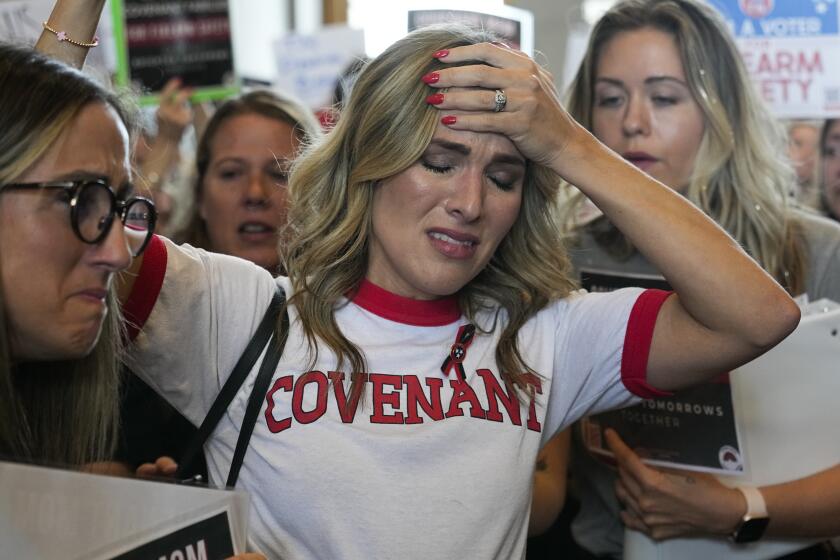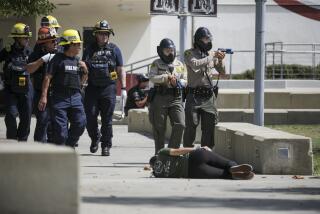Tennessee lawmakers pass bill to allow armed teachers, a year after deadly school shooting

- Share via
NASHVILLE — Protesters chanted “Blood on your hands!” at Tennessee House Republicans on Tuesday after the chamber passed a bill that would allow some teachers and staff to carry concealed handguns on public school grounds and bar parents and other teachers from knowing who was armed.
The 68-28 vote sent the bill to Republican Gov. Bill Lee for consideration. If he signs it into law, it will be the state’s biggest expansion of gun access since last year’s deadly shooting at a private elementary school in Nashville.
Members of the public who oppose the bill harangued GOP lawmakers after the vote, leading Speaker Cameron Sexton to order the galleries cleared.
Four House Republicans and all Democrats opposed the bill, which the state Senate had previously passed. Under the measure, only school administrators and police could know which employees were carrying guns; disclosure to students’ parents and even other teachers would be barred.
Before a school’s staff members could carry guns, its principal, district and relevant law enforcement agency would have to agree.
The proposal is a starkly different response to the Covenant School shooting than Gov. Lee had proposed last year: His push to keep guns away from people deemed a danger to themselves or others was quickly cast aside by Republican legislators.
But a veto appears unlikely, since it would be a first for Lee, and lawmakers would need only a simple majority of each chamber’s members to override it.
The shooter, described as a 28-year-old Nashville resident, was armed with at least two assault rifles and a handgun, officials say.
“What you’re doing is you’re creating a deterrent,” the bill’s sponsor, Republican state Rep. Ryan Williams, said before the vote. “Across our state, we have had challenges as it relates to shootings.”
Republicans rejected a series of Democratic amendments, including for parental consent, notification when a staff member is armed, and a school district’s assumption of civil liability in case of injury, damage or death due to staff carrying guns.
“My Republican colleagues continue to hold our state hostage, hold our state at gunpoint, to appeal to their donors in the gun industry,” Democratic state Rep. Justin Jones said. “It is morally insane.”
In the chaos after the vote, Democratic and Republican lawmakers accused each other of violating House rules, but voted to reprimand only Jones, for recording on his phone. He was barred from speaking on the floor through Wednesday.
At state capitols, families are retelling tragedies caused by mass school shootings hoping lawmakers will reconsider firearm policies.
It’s unclear whether any school districts will take advantage if the bill becomes law.
A Metro Nashville Public Schools spokesperson, Sean Braisted, said that district believes “it is best and safest for only approved active-duty law enforcement to carry weapons on campus.”
About half of the U.S. states in some form allow teachers or other employees with concealed-carry permits to have guns on school property, according to the Giffords Law Center, a gun control advocacy group.
In Iowa last week, the GOP governor signed a bill into law to create a professional gun permit for trained school employees to protect them from criminal or civil liability for use of reasonable force.
In Tennessee, a shooter indiscriminately opened fire in March 2023 at the Covenant School — a private Christian school in Nashville — and killed three children and three adults before being killed by police.
Despite subsequent campaigns for significant gun control measures, lawmakers in the state largely refused. They dismissed gun control proposals by Democrats and by the GOP governor during regular and special sessions, even as parents of Covenant students shared accounts of the shooting and its lasting effects.
Under the bill that passed Tuesday, in order to carry a gun at school an employee would need a handgun carry permit and written authorization from the principal and local law enforcement. They would also need to clear a background check and undergo 40 hours of handgun training. They wouldn’t be allowed to carry a gun at school events at stadiums, gymnasiums or auditoriums.
In 2016, Tennessee passed a law allowing armed school workers in two rural counties, but it wasn’t implemented, according to WPLN-FM.
The state’s Republicans have regularly loosened gun laws, including in 2021, when Lee backed a law allowing handguns to be carried without a permit.
The original law allowed residents 21 and older to carry handguns in public without a permit. Two years later, state Atty. Gen. Jonathan Skrmetti struck a deal amid an ongoing lawsuit to extend the law to those as young as 18.
Shortly after last year’s shooting, state Republicans also passed a law to bolster protections against lawsuits involving gun and ammunition dealers, manufacturers and sellers.
And earlier this year, lawmakers and the governor signed off on allowing private schools with pre-kindergarten classes to have guns on campus. Private schools without pre-K students were already allowed to decide whether to allow guns on their grounds.
State legislators have also advanced some narrow gun limitations. One awaiting the governor’s signature would involuntarily commit certain criminal defendants for inpatient treatment and temporarily remove their gun rights if they are ruled incompetent for trial due to intellectual disability or mental illness.
Another House-passed bill that still needs Senate approval would remove the gun rights of juveniles deemed delinquent due to certain offenses, ranging from aggravated assault to threats of mass violence, until they turn 25.
Mattise writes for the Associated Press.
More to Read
Sign up for Essential California
The most important California stories and recommendations in your inbox every morning.
You may occasionally receive promotional content from the Los Angeles Times.












